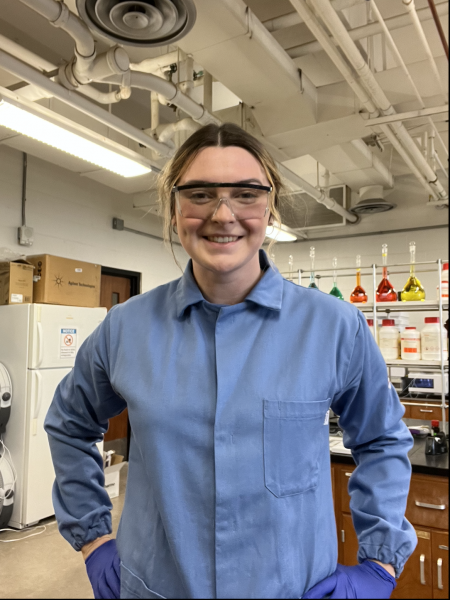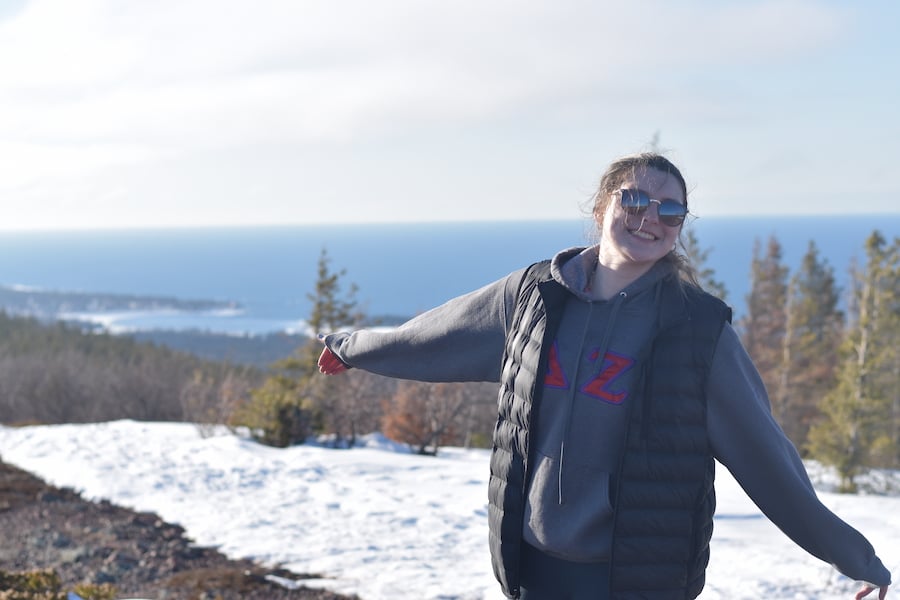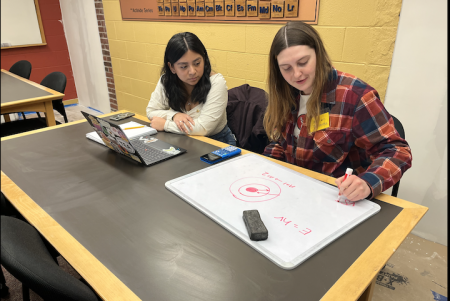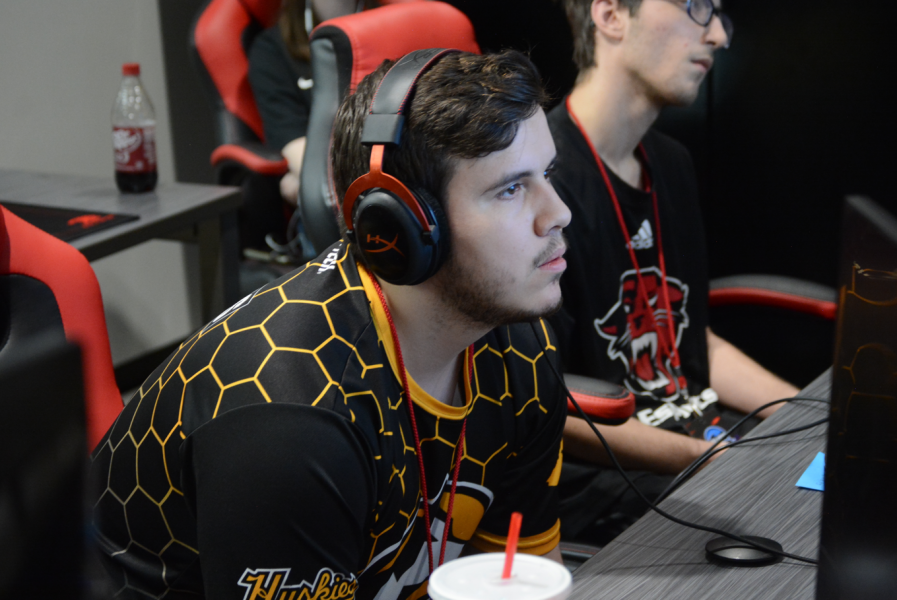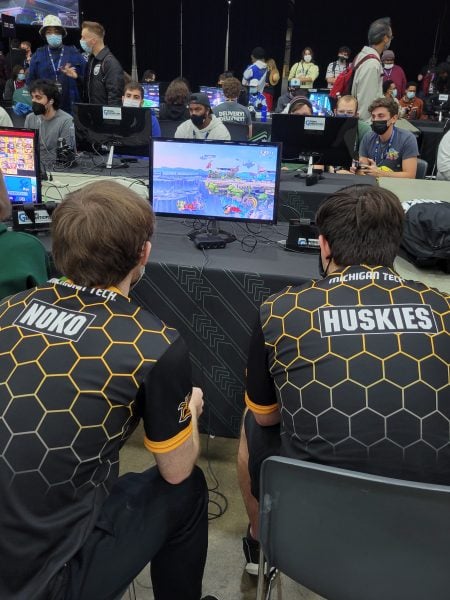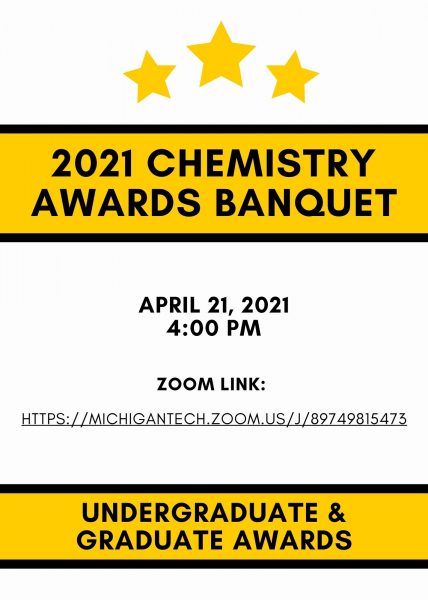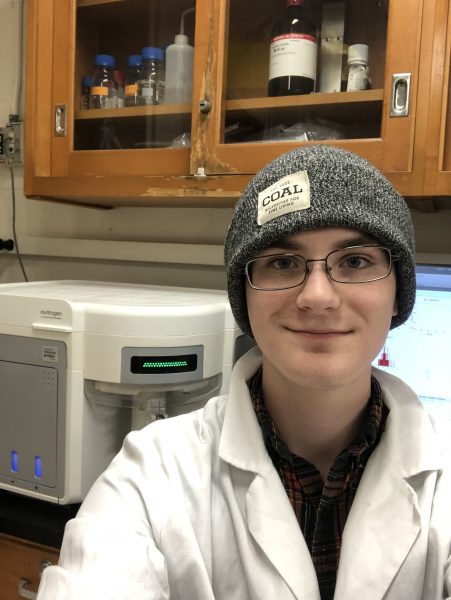
High school students are often unsure of what major to select when applying to college. There are so many interesting fields to choose from. Even when you think you have settled on a degree path, exposure to different subjects and concepts in the first year can steer you in a different direction. Such is the case for Vincent Pellizzon, although the change from pharmaceutical chemistry to biochemistry is nuanced. Learn about Vincent’s journey to a Bachelor of Science in Biochemistry and Molecular Biology with a chemistry focus.
Vincent Pellizzon’s Chemistry Attraction
Vincent Pellizzon’s interest in chemistry blossomed at Forest Hills High School in Grand Rapids. Energetic and exciting lessons, riddled with humor from Russell Chudy, drew Vincent into chemistry. His AP Chemistry teacher, David VonEhr pushed him to learn and succeed. “I enjoyed learning the more advanced concepts from Mr. Von Ehr. He showed me I had the talent for chemistry and motivated me to learn more about what I could do with it,” he says.
Vincent came to Tech interested in pharmaceutical chemistry (now offered as medicinal chemistry) but soon realized it was focused on designing and synthesizing medicines. He yearned for a broader curriculum. “After switching, I was put into a lot more bio classes, which I thoroughly enjoyed! Microbiology, molecular biology, and genetics were all classes that were not included in the pharmaceutical chemistry program. I realized I don’t want to learn about chemical synthesis and analysis as much as I want to study the properties of the resulting molecules and their impacts on biological processes. Of course, synthesis and identification will be a huge part of the job, but certainly not my focus!” he says.
Plus, a paper mill engineer he spoke to recommended he switch to a more general degree. He enjoyed Andrew Galerneau’s Organic Chemistry Lab 1 class at Tech. He realized he was attracted to the biological and organic aspects of chemistry. “Life is complicated and interesting. There are many mechanisms involved in different processes. We can now throw a chemical into a process to see how it impacts the process. As a biochemist, I can help develop therapies.”
Switching to Biochemistry
It was clear that first year at Tech, chemistry was a good fit. Vincent won the Outstanding Student in First Year Chemistry award. He switched to the Bachelor of Science in Biochemistry and Molecular Biology. Vincent loves biochemistry. He likes to see how compounds can impact a system. And he wants to dig into the how. Vincent says, “Secrets are boring. I want to know the answers. Why can’t I know?”
“After I began my summer research, I dove into some of the biological mechanisms that are involved in hypertension, specifically with oxidative stress. As we’ve continued, we began to focus on the mitochondria, the subcellular organs that make energy, as the main drug targets to alleviate hypertension. Will this compound reduce oxidative stress in the mitochondria? Then we would ask how does this compound affect oxidative stress in the mitochondria? What mechanism is it acting on? Directly by reducing harmful species, or by restoring function to a biological pathway that helps reduce the harmful species or otherwise benefits the mitochondria?” Vincent says.
Helping Peers in the Chemistry Learning Center
Vincent puts his knowledge of chemistry to good use for others as a Chemistry Learning Center (CLC) coach. “I love working in the CLC. It all started with AP chemistry in my junior year of high school. A majority of my classmates were struggling, and I found that I enjoyed explaining chemical concepts and helping others understand chemistry and be successful in their classes. I work in the CLC because I like helping students learn chemistry, no matter the level that they are at, and the feeling of reward knowing that I have helped someone makes it worth it,” he says.
“I personally prefer more informality than some coaches because I feel it creates a more comfortable environment for my students. Who wants to go into a stuffy learning environment where the coaches feel they’re superior to you? Everyone learns at a different rate and with a different style, that’s why we have the CLC and why we want to support our students,” he says.
Applied Learning Doing Hypertension Research in the Lab
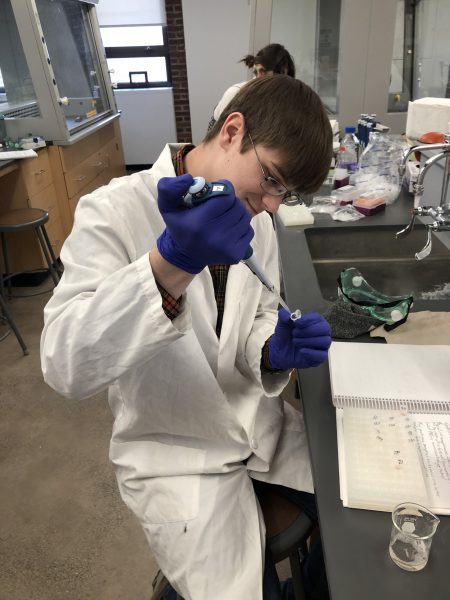
Applied learning in the lab augments Vincent’s biochemistry studies. He is working with Lanrong Bi and Zhiying Shan to alleviate hypertension. Vincent says, “I chose this focus because hypertension is extremely common and is a major risk factor in many diseases, which affect millions of people every year. I have always had an interest in anatomy, particularly with the cardiovascular system and the vasculature, and after doing a paper in my second year about nitric oxide synthase I became aware of and interested in the effects of oxidative stress on the cardiovascular system. My dad is a cardiologist and when I was young I also wanted to be a doctor, so I guess I inherited his interest in the cardiovascular system and my mom’s interest in pharmaceuticals!”
Vincent’s research is tricky as there are many causes of hypertension. His research focuses on relieving oxidative stress, preventing damage in mitochondria, and helping the cell degrade/dissolve damaged mitochondria. He explains, “This research focuses on the solid-phase synthesis of peptide-based antioxidants that target the mitochondria. We have this core structure that consists of an antioxidant moiety (chemical group) called Tempo and three amino acids, RGD, (Arginine [R], Glycine [G], and Aspartic Acid [D]). The solid-phase part means we’re not synthesizing these in solution, but immobilizing it on a solid surface and adding each part stepwise.”
“What I’m doing is adding another antioxidant amino acid to that chain to make some Tempo-RGD with another amino acid appended onto the chain. We are analyzing how adding 5 different amino acids with antioxidant properties changes the antioxidant strength of the Tempo-RGD and its ability to localize to the mitochondria. The point of the antioxidants is to reduce oxidative stress in the vasculature’s mitochondria with the goal of relieving hypertension. Oxidative stress and hypertension are deeply connected, and essentially no matter how hypertension has been induced there is an imbalance of radical Reactive Oxygen Species (ROS), and removing the ROS is increasingly proving to be a good way of mitigating hypertension. Dr. Bi’s lab is heavily focused on the phenomena called autophagy, or the process by which a cell recycles its own molecules and organelles,” he explains.
Growing Cells in the Lab
Vincent is learning how to better work with eukaryotic cells, living cells that contain membrane-bound organelles such as a nucleus, mitochondria, and an endoplasmic reticulum. He is learning how to grow these cells outside the body. It’s a fundamental tool to use in the biochemistry field. This way he can study processes that may be too dangerous to perform on a living thing, while still seeing how a chemical or drug impacts the cells.
Vincent says, “By growing or synthesizing cells outside of the body, researchers can see the detail of how a process is progressing. It’s a baseline. Helps me answer the question: do I have a good idea? Easy to find the first steps of what I am doing. And testing on living organisms gives you the best results. All of the assays (processes to measure the concentration or find something in a solution) I have learned about are also very interesting, and I hope I can interpret data from them as well as the experts in the field. In the lab here at Tech, I am learning from an expert about the chemicals they are using and processes.” Vincent is looking forward to blasting cells with a drug he is creating in the lab.
Expectations for Research
Vincent has great expectations for his research. “I truly hope that we can use mitochondrial-targeted antioxidants to eliminate hypertension,” he says. “Right now, drugs like calcium blockers and ACE2 inhibitors reduce blood pressure but do not necessarily treat the underlying problem. Antioxidants and other drugs that promote the removal of defective mitochondria are, in theory, much “closer” to the right way to treat this, in my opinion. I think the future of hypertensive therapy is going to be ace-inhibitor and antioxidant cotherapy. They will not entirely eliminate it but pragmatically can make a dent. It’s important because hypertension impacts many systems and organs, like the kidney, heart, and cardiovascular system.”
Research Has Its Rewards
In the Spring of 2022, Vincent was one of two undergraduate winners of The Songer Award for Human Health Research. The award supports students doing health-related research in the College of Sciences and Arts, thanks to the generosity of Matthew Songer ’79, BS Biological Sciences, and Laura Songer ’80 BS Biological Sciences. The $4,000 award, along with matching funds from the College of Sciences and Arts, helped him continue his research.
Tech Love, Tech Life
In talking to Vincent, it is clear he loves Michigan Tech for a number of reasons. “Michigan Tech is a wonderful community in which to study biochemistry. The academics are amazing. All these non-engineering STEM departments are small. There is a collective knowledge here I don’t think I could have experienced anywhere else,” he says. “It’s been amazing to see my own development. Tech has helped me to grow so much.”
And it’s not just the academics. “The atmosphere and the environment- I just love Michigan Tech. I love my degree. I am quite content with life here, and I have fun with friends.”
Vincent has accomplished a lot in four years at Tech. His hard work has led to many opportunities to make a difference in the Chemistry Learning Center and in the lab. He sees it all as part of an investment in his future. “If I am not working hard for my degree, I am just wasting time and money,” he says.
What’s Next For Vincent Pellizzon?
Vincent is graduating in the spring of 2023 with a Bachelor of Science in Biochemistry and Molecular Biology with a chemistry focus. He will enter the accelerated master’s in chemistry with Dr. Bi as his advisor and continue his hypertension research. “If you want to do research, getting your master’s is a great route to go. And Tech makes it easy to get your master’s with just one additional year,” he says.
“With my master’s I can embark on a career where I will have some influence over what we are doing and why. I can be more involved than I would otherwise be as a technician. I can lead projects and have more say in experimental design. I can get the experience faster. And maybe get a sponsor for a PhD afterward,” he says.
“I’m really heavily considering going for a Ph.D. now. I feel confident enough to accomplish it, and I finally realized that my childhood dream of being a scientist is so close to being realized. Being a PhD would allow for so much more flexibility in projects, and honestly, I love the school environment so I am also considering possibly becoming a professor since they are also leading experts in their fields. Regardless of whether or not I get my PhD, I am firmly set in my interests of ROS stress and hypertension and want to continue doing this for many years to come.”
It’s easy to envision the day students like Vincent will be sitting in his classroom. Or will be getting some extra help in the Chemistry Learning Center for the next exam from Professor Pellizzon. Perhaps Professor Pellizzon will help many students to find the path that is right for them. And we look forward to the day when we will find a link to his latest research publication on PubMed.
